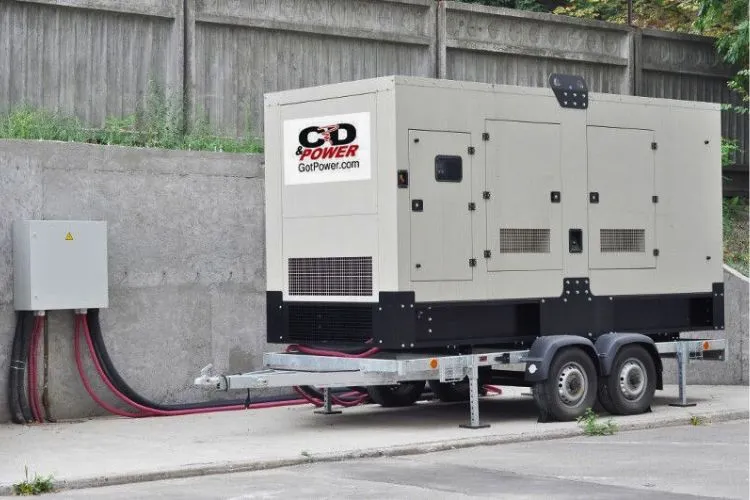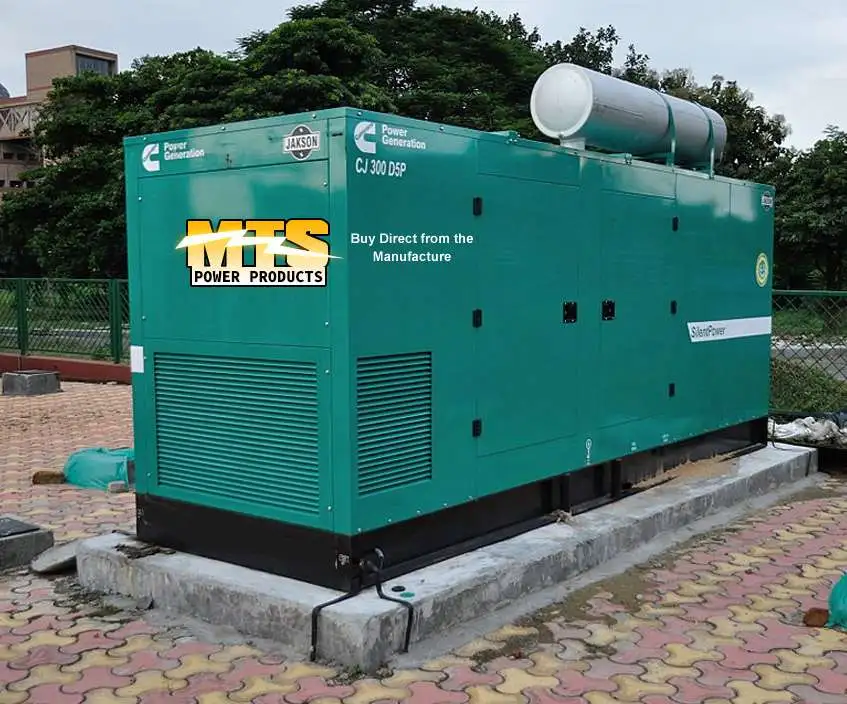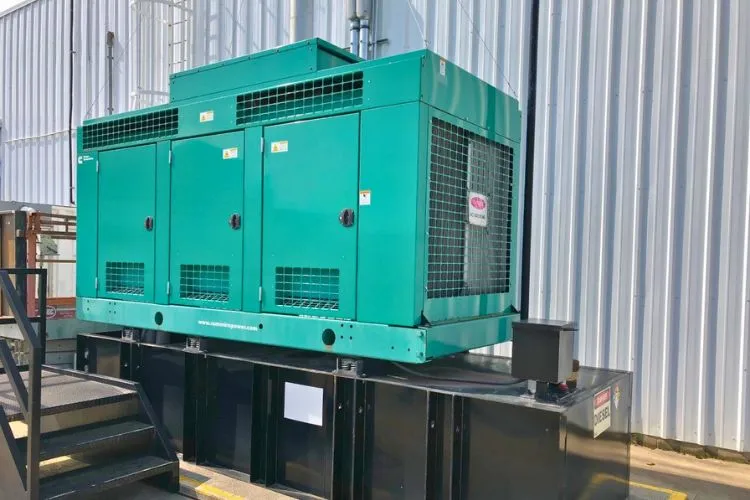Deciding on the right power backup is crucial for any business operation, ensuring your systems stay running smoothly during power outages.
When choosing between new and used commercial generators, several factors come into play, including cost, reliability, and maintenance history.
Deciding on the right kind of power backup is crucial for any business operation.
When choosing between new and used commercial generators, various factors come into play.
So, should you buy a used commercial generator?
This guide delves deep into the nuances of purchasing a used commercial generator to help you make an informed decision.

Should You Buy a Used Commercial Generator?
The short answer is yes, in fact, buying a used commercial generator can be a good decision if you conduct thorough research.
Ensure the generator has a reliable maintenance history, low operating hours, and comes from a reputable source. It is also crucial to have it inspected by a qualified technician to assess its condition and potential lifespan.
If the used generator meets these criteria, it can offer significant cost savings compared to a new one while still providing reliable performance.
Why Consider Used Commercial Generators?
The primary allure of opting for a used generator is the cost-effectiveness. Buying used often allows access to higher quality brands or larger models that would be outside of budget if purchased new.
Moreover, such units are readily available, bypassing the long waits sometimes associated with new models.
However, the appeal of lower initial costs is tempered by potential downsides. Used generators have finite lifespans, and previous usage might have induced wear and tear that can shorten the service duration further.
Additionally, the absence of a manufacturer’s warranty can mean higher risks and potential extra costs in maintenance and repairs.
Important Factors When Buying Used

Age and Usage History
Understanding the age and how much a generator has been used is critical. A unit might look fine on the outside but may have operated for thousands of hours, leading to possible internal wear.
Always ask for detailed usage logs and the operational history of the generator.
Maintenance and Service Records
A well-maintained generator is likely to have a longer lifespan. Request comprehensive maintenance records to gauge how well the previous owner kept up with necessary upkeep.
Regular maintenance checks indicate a responsible owner and a likely healthier machine.
Generator Type and Size Requirements
Match the generator type and size to your specific power needs. An undersized generator won’t handle your demands, while an oversized one could lead to inefficient operation and higher operational costs.
Proper evaluation ensures you get a unit that aligns with your requirements.
Inspection and Testing Prior to Purchase
Before finalizing any purchase, thoroughly inspect and test the generator. If possible, bring along a qualified technician who can assess the unit’s condition and perform a load test to ensure it operates effectively under stress.
Cost-Benefit Analysis
Weighing the short-term savings against long-term expenditures is vital. A used generator might save money upfront but consider potential costs like repairs, parts replacement, or even an untimely replacement if the unit fails.
Assessing these aspects helps predict whether the investment is sound over time.
Pitfalls to Avoid
One common mistake in purchasing used generators is neglecting thorough inspection. Skipping detailed checks can lead to buying a unit with hidden issues, resulting in costly repairs down the line.
Always vet sellers carefully, ensuring they are reputable and transparent about the generator’s condition and history.
Making the Decision
Here is a simple checklist to assist you through the buying process:
- Verify the age and usage.
- Ensure maintenance records are complete.
- Conduct a thorough physical inspection.
- Perform a load test with the help of a technician.
- Compare the cost of the used unit against a new one, considering potential future expenses.
When the cost of potential repairs and the risk of a shorter lifespan outweigh the immediate savings, consider purchasing a new generator instead.
Environmental Considerations
Choosing a used commercial generator over a new one has meaningful environmental implications. This choice aligns with sustainability practices by promoting the reuse and recycling of heavy equipment, which in turn minimizes waste and demands on raw materials.
Every used generator that finds a new home contributes to a decrease in industrial production pollution, a significant source of environmental degradation.
Reusing generators extends the lifecycle of these robust machines, ensuring that the energy and resources spent in their manufacture deliver maximum value before retirement.
Moreover, the process reduces the carbon footprint associated with manufacturing new generators, including the mining, refining, and transportation of materials.
While environmental regulations continue to evolve, favoring more efficient and less polluting new models, many used generators still operate within acceptable emission standards.
Thus, buying used not only represents an act of recycling but also supports a broader commitment to conserving resources and reducing the environmental impact of business operations.
Legal and Compliance Issues
Navigating legal considerations is crucial when purchasing a used commercial generator.
Compliance with emissions regulations is mandatory, as failure to comply can result in substantial fines and operational shutdowns.

Emission standards are set by environmental protection agencies and can vary by location, requiring due diligence to ensure adherence.
Noise ordinances are equally important. Generators operating above allowed decibel levels can violate local noise codes, attracting penalties and necessitating costly retrofits to meet regulations.
It’s essential to confirm that a used generator operates within permissible noise levels for its intended operational area.
To ensure compliance, potential buyers must verify that the generator adheres to the relevant local and federal standards.
This involves checking for uptodate certificates of compliance or emissions tests and may also include consulting with compliance officers or legal authorities.
Proactively addressing these legal aspects is vital to achieving a responsible and lawful operation of the used generator.
Frequently Asked Questions (FAQs)
What warranty considerations should I be aware of?
Always check the remaining warranty, if any. Some manufacturers allow warranty transfers, which can add significant value and peace of mind to your purchase.
How do I assess the true condition of a used generator?
Hire a professional to inspect the generator thoroughly. Look for any signs of excessive wear or damage and test the generator under load to assess its performance fully.
Are there financing options for used commercial generators?
Many equipment dealers offer financing options. Always explore these possibilities as they can help manage cash flow while acquiring essential business equipment.
How does generator size impact my decision?
The required generator size greatly impacts your decision as it needs to meet your power demands without being overly large, which can lead to unnecessary fuel costs and maintenance issues. Always calculate your power needs carefully before deciding on the generator size.
Conclusion:
Buying a used commercial generator can be a smart business decision, provided you do your homework and proceed with caution.
Pay attention to the unit’s history, current condition, and how well it fits into your operational needs.
Being diligent in your evaluation process ensures you secure a reliable power source that offers value for your investment.
By following this guide, you are equipped to make a well-informed decision, ensuring that your investment into a used commercial generator is both practical and beneficial for your business operations.
